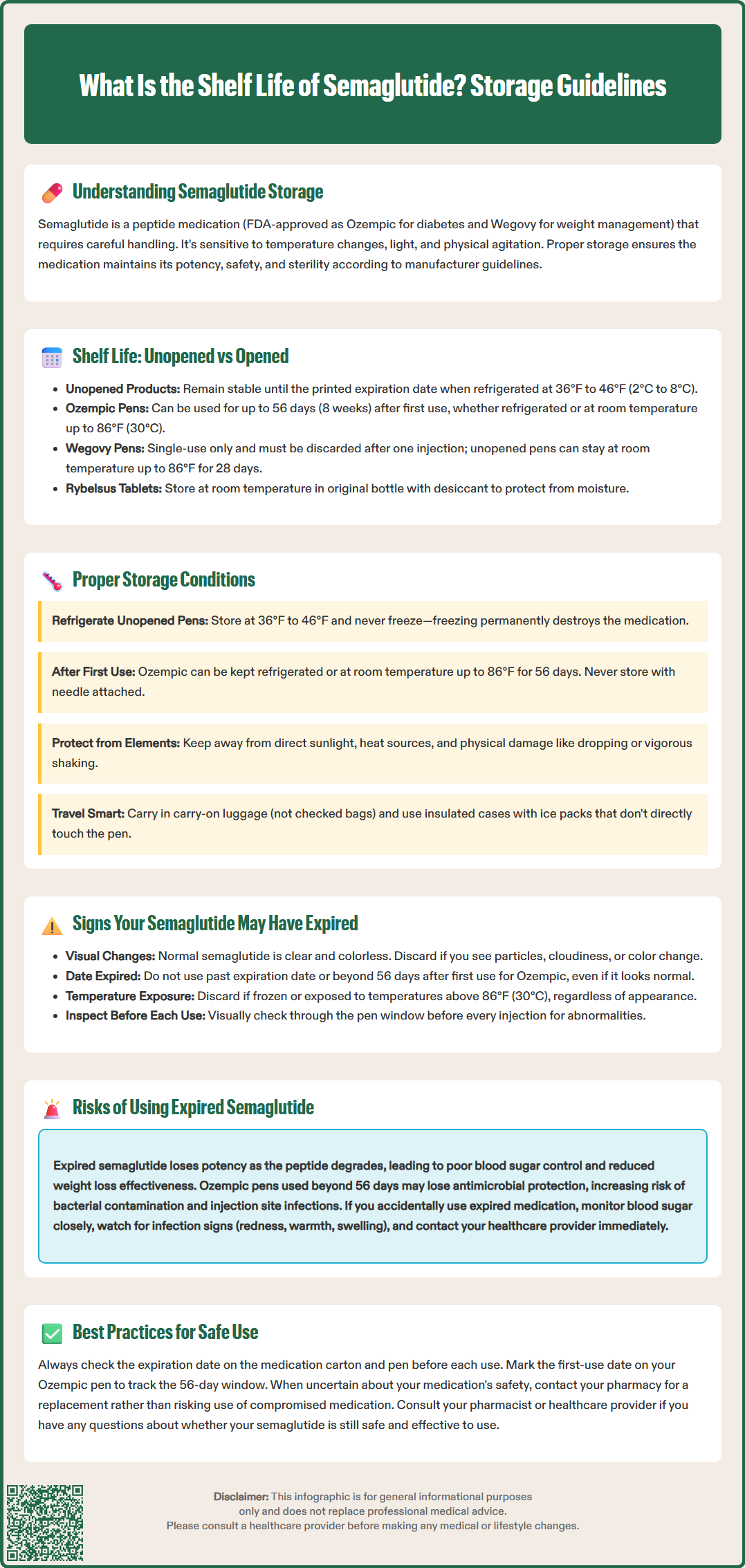LOSE WEIGHT WITH MEDICAL SUPPORT — BUILT FOR MEN
- Your personalised programme is built around medical care, not willpower.
- No generic diets. No guesswork.
- Just science-backed results and expert support.
Find out if you’re eligible

Semaglutide, a GLP-1 receptor agonist approved for type 2 diabetes (Ozempic) and weight management (Wegovy), requires careful storage to maintain effectiveness. The shelf life of semaglutide depends on whether the medication remains unopened or has been used, with specific timeframes established through FDA-approved stability testing. Unopened semaglutide stored properly in the refrigerator remains stable until the printed expiration date, while opened Ozempic pens maintain potency for 56 days after first use. Understanding these guidelines ensures optimal therapeutic outcomes and prevents use of degraded medication that could compromise blood sugar control or weight management results.
Quick Answer: Unopened semaglutide remains stable until the printed expiration date when refrigerated, while opened Ozempic pens are effective for 56 days after first use.
Semaglutide is a glucagon-like peptide-1 (GLP-1) receptor agonist approved by the FDA for type 2 diabetes management (under the brand name Ozempic) and chronic weight management (Wegovy). As a peptide-based prescription medicine, semaglutide requires careful handling to maintain its structural integrity and clinical efficacy. Unlike small-molecule drugs that may remain stable at room temperature, peptide medications are sensitive to environmental factors including temperature fluctuations, light exposure, and physical agitation.
The shelf life of semaglutide refers to the period during which the medication retains its intended potency, safety, and sterility when stored according to manufacturer specifications. This timeframe is established through rigorous stability testing conducted during the drug development process, ensuring that the active pharmaceutical ingredient remains within acceptable potency limits throughout the stated expiration period.
Understanding proper storage and expiration guidelines is essential for both healthcare providers and patients. Using semaglutide beyond its shelf life or storing it improperly may result in reduced therapeutic effectiveness, potentially compromising glycemic control or weight management outcomes. Additionally, degraded products may pose safety concerns.
Patients should always check the expiration date printed on the medication carton and pen before use, and consult their pharmacist or healthcare provider if they have questions about medication viability. Proper storage practices are fundamental to maximizing the medication's shelf life and ensuring optimal therapeutic benefit.
The shelf life of semaglutide varies significantly depending on the specific product and whether it remains unopened or has been used.
According to FDA-approved labeling, unopened semaglutide products should be stored in the refrigerator at 36°F to 46°F (2°C to 8°C) and will remain stable until the expiration date printed on the carton and pen label. Patients should always verify the specific expiration date on their medication.
For Ozempic (semaglutide for type 2 diabetes), once the multi-dose pen is first used, it may be used for up to 56 days (8 weeks) after first use, whether stored in the refrigerator or at room temperature up to 86°F (30°C).
For Wegovy (semaglutide for weight management), each pen is designed for single-dose, single-use only and should be discarded after one injection, even if medication remains in the pen. Unopened Wegovy pens may be stored at room temperature up to 86°F (30°C) for up to 28 days prior to use.
For Rybelsus (oral semaglutide tablets), the medication should be stored at room temperature in the original bottle with the desiccant to protect from moisture.
For Ozempic multi-dose pens, the 56-day in-use period exists because once the pen seal is broken and the first injection administered, the sterile barrier is compromised. Repeated needle insertions and potential exposure to environmental contaminants create conditions where bacterial growth could theoretically occur.
Patients using Ozempic should mark the date of first use directly on the pen label to track the 56-day window accurately. If the expiration date printed on an unopened pen occurs before the 56-day in-use period would end, the earlier date takes precedence—always use the most conservative expiration guidance.

Maintaining appropriate storage conditions is critical to preserving semaglutide's stability and therapeutic efficacy throughout its shelf life.
For Ozempic and Wegovy:
Unopened pens must be stored in the refrigerator at temperatures between 36°F and 46°F (2°C to 8°C)
Keep in the original carton to protect from light exposure
Never store in the freezer; if accidentally frozen, discard immediately—freezing irreversibly damages the medication
For Ozempic after first use:
May be stored in the refrigerator (36°F to 46°F/2°C to 8°C) or at room temperature up to 86°F (30°C) for up to 56 days
Never store with the needle attached, as this can lead to medication leakage, air bubble formation, or needle blockage
For Wegovy:
Unopened pens may be stored at room temperature up to 86°F (30°C) for up to 28 days before use
Each pen is for single use only and should be discarded after one injection
For Rybelsus:
Store at room temperature between 68°F and 77°F (20°C to 25°C)
Keep in the original bottle with the desiccant to protect from moisture
Keep the bottle tightly closed
Additional storage precautions include:
Avoid direct sunlight and heat sources: Keep pens away from windowsills, car dashboards, or heating vents
Prevent physical damage: Do not drop or shake the pen vigorously, as mechanical stress can damage the medication
Maintain consistent temperature: Avoid repeated temperature cycling when possible
Keep away from children and pets: Store in a secure location
When traveling, patients may use insulated medication travel cases with ice packs (ensuring the pen doesn't directly contact ice) or store the pen in hotel room refrigerators. For air travel, semaglutide should be carried in carry-on luggage rather than checked baggage, where temperatures may fall below freezing. The Transportation Security Administration (TSA) permits medications in carry-on bags, and patients may wish to carry their prescription information when traveling.
Recognizing signs of semaglutide degradation is essential for patient safety and therapeutic effectiveness. Before each injection, patients should visually inspect the medication through the pen's viewing window. Normal semaglutide solution should appear clear and colorless. Do not use if the solution contains particles, is cloudy, or colored.
Specific warning signs that semaglutide may have expired or become compromised include:
Particulate matter: Visible floating particles or sediment
Cloudiness or turbidity: The solution appears hazy or opaque rather than clear
Color changes: Any discoloration (solution should be clear and colorless)
Pen malfunction: Difficulty advancing the dose selector or resistance during injection (though this may indicate a device issue rather than medication expiration)
Beyond visual inspection, patients should verify that the medication has not exceeded its expiration date or, for Ozempic, the 56-day in-use period. Even if the solution appears normal, semaglutide should not be used past these timeframes, as potency degradation may occur without visible changes.
If semaglutide has been exposed to temperatures outside the recommended range—particularly freezing or prolonged heat exposure above 86°F (30°C)—it should be discarded regardless of appearance. Temperature excursions can damage the medication even when visual changes are not immediately apparent.
Patients who notice any concerning changes in their medication should not use it and should contact their pharmacy for a replacement. Healthcare providers should counsel patients on proper inspection techniques during initial prescribing and reinforce this guidance at follow-up visits. When in doubt about medication integrity, the safest approach is to obtain a fresh supply rather than risk using potentially compromised medication.
Using expired semaglutide primarily raises concerns about reduced therapeutic efficacy. As peptide medications degrade over time, the active structure may break down, resulting in diminished potency. Patients using expired semaglutide may experience inadequate glycemic control, with higher-than-target blood glucose levels, or reduced weight loss compared to expected outcomes.
From a safety perspective, the FDA and pharmaceutical manufacturers establish expiration dates based on stability testing to ensure medication quality and effectiveness. Using medication beyond the expiration date means the manufacturer can no longer guarantee its potency, purity, or safety.
Sterility concerns represent another consideration, particularly for Ozempic pens used beyond the 56-day in-use period. While the preservative system in semaglutide formulations provides antimicrobial protection, this protection may diminish over extended periods, potentially allowing bacterial contamination. Injection of contaminated medication could result in local injection site infections.
Patients who inadvertently use expired semaglutide should:
Monitor blood glucose levels closely (for diabetes patients) to detect any loss of glycemic control
Watch for injection site reactions such as increased redness, warmth, swelling, or pain that could indicate infection
Contact their healthcare provider to report the incident and obtain guidance on next steps
Obtain a fresh supply and resume treatment with properly stored, unexpired medication
Healthcare providers should emphasize the importance of adhering to expiration guidelines. For patients with recurrent issues accessing fresh medication before expiration, providers should explore barriers such as insurance coverage gaps, affordability concerns, or dosing frequency that may be contributing to medication waste. Adjusting prescription quantities or connecting patients with patient assistance programs may help ensure consistent access to viable medication.
Once opened, Ozempic pens remain effective for 56 days (8 weeks) after first use, whether stored in the refrigerator or at room temperature up to 86°F. Mark the first-use date on the pen to track this timeframe accurately.
No, semaglutide that has been frozen should be discarded immediately. Freezing irreversibly damages the medication's structure and compromises its effectiveness, even if it appears normal after thawing.
Normal semaglutide solution should appear clear and colorless without any particles. Do not use the medication if it appears cloudy, discolored, or contains visible floating particles or sediment.
All medical content on this blog is created using reputable, evidence-based sources and is regularly reviewed for accuracy and relevance. While we strive to keep our content current with the latest research and clinical guidelines, it is intended for general informational purposes only.
This content is not a substitute for professional medical advice, diagnosis, or treatment. Always consult a licensed healthcare provider with any medical questions or concerns. Use of this information is at your own risk, and we are not liable for any outcomes resulting from its use.